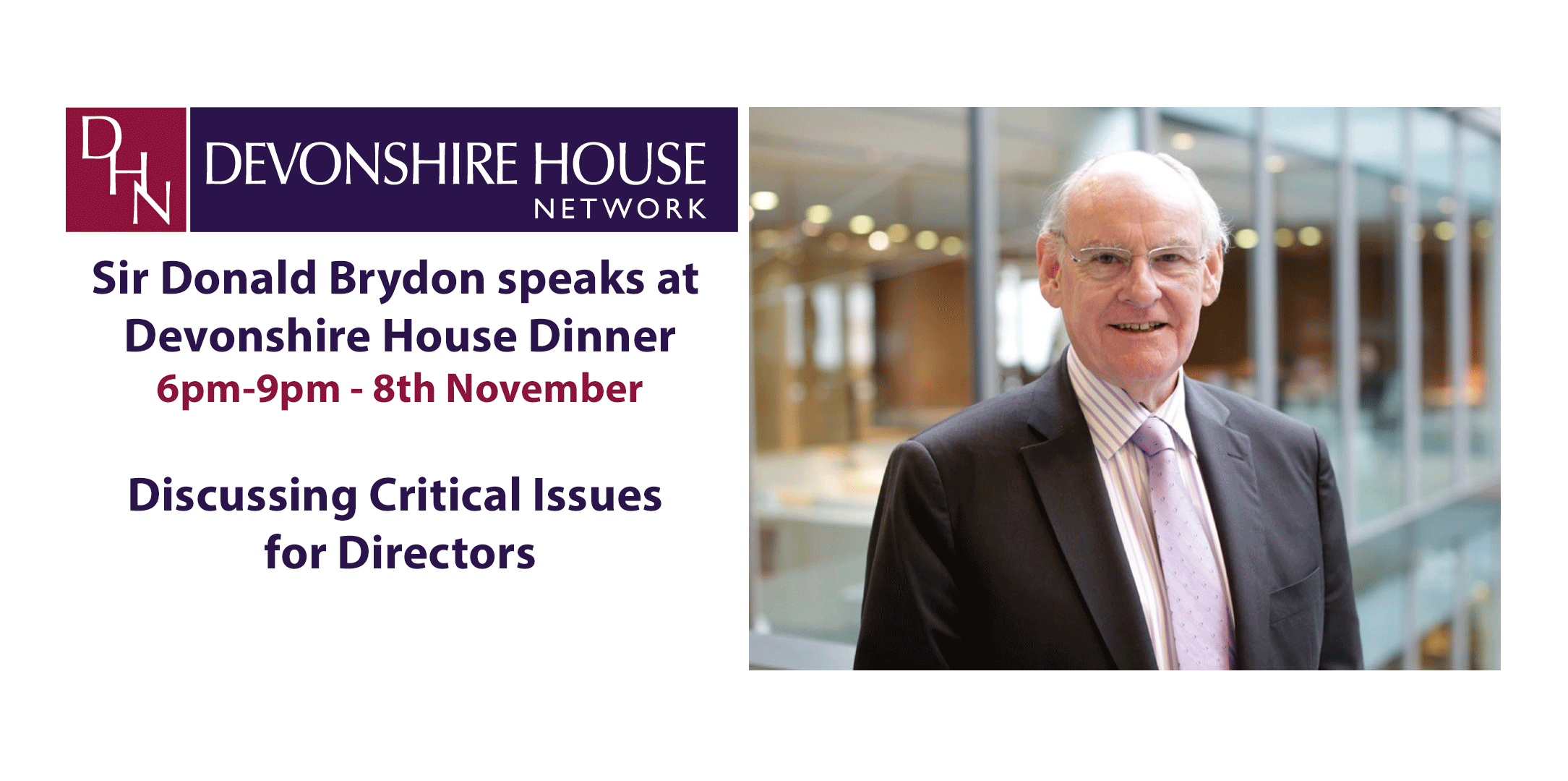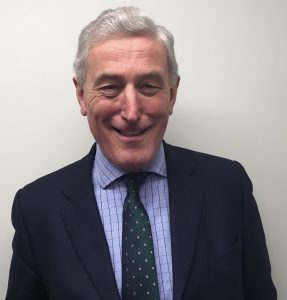Review: Sir Donald Brydon Dinner – 8.11.22

Sir Donald Brydon addresses Devonshire House Network Dinner – 8.11.22
A Post Event Review by Barry Gamble. 1.12.22
“Directors in the present age. How businesses now need to be run and how directors need to react to and shape that process”.
About Sir Donald
With a BoardEx profile running to no less than 10 pages, Sir Donald has had a hugely distinguished career. This was recognised in the 2019 New Year’s Honours when he was knighted for services to business and charity. In total, BoardEx notes some 70 years in aggregate serving as chairman or senior independent director. He currently chairs four boards including a cutting edge AI business, and two innovative financial services businesses. His main current charity role is “Chance to Shine”. His previous roles include Chairman of Amersham, Royal Mail, Smiths Group, London Stock Exchange and Sage Group. In 2019 he authored The Brydon Report, a report of the Independent review into the quality and effectiveness of audit. He is also the 2021 Life Time Achievement Award Holder of the Sunday Times NED Awards.
History
Thirty years ago, now, the scandal surrounding the business affairs and death of publisher Robert Maxwell who disappeared from his yacht Lady Ghislaine prompted the Cadbury Report ( This landmark Report defined corporate governance as “the system by which companies are directed and controlled.”)
Much started with Cadbury
In a grand sweep which one might be tempted to note was “anchored” back to Cadbury, City Veteran, Sir Donald Brydon, addressed Devonshire House Network.
Early Stages
His early experience of shareholder engagement came through attending AGMs on behalf of his fund management bosses. He quickly realised the limitations of these efforts to influence boards, even if one had the votes. At the time he noted, so much went on, with mostly quiet efficiency in his view, behind closed doors. He also witnessed the legendary James Hanson offering strategy to boards in what were to become the early days of activism.
But with Cadbury, in Sir Donald Brydon’s view, came a fundamental design flaw.
Delegating important board responsibilities to committees such as Audit, Risk, Nominations, Remuneration, and others since, meant that directors were too easily disconnected from the things that mattered. In his view those directors which were not on the audit committee would struggle to really understand what was going on in the business. Bringing a report of the Audit Committee to the board did not cut it, he felt. The committee structure although established to give those directors something to do has passed its sell buy date.
How well do Boards work?
As well as being concerned as to how well boards work and how directors are fully informed, he has a concern about the effectiveness of today’s non-executive directors. He loathes the expression “to be on a board” since he feels all directors should be part of the company focused on a viable business model which ensures it makes money.
How Independent are NEDs?
He wonders also whether directors are as truly independent as they might claim particularly when they carve out a career as a non-executive and therefore become dependent on their fees for a living. He notes, in particular, a number of very able women have given up full time executive careers to “go plural”.
In this respect, when interviewing a prospective non-executive he considers the individual’s motivation should be clear. As an aside he questioned how well interview practices had been developed to be more analytical rather than just a conversation.
The second design flaw of formal governance codes
This is, he feels, the very existence of the Stewardship Code. He is very clear in his view that the board and not the investors are the stewards of the company. He would expect investors to offer input and for sensible boards to listen but the responsibility had to be with the board.
Although there is a clear trend to diversify the composition of boards he feels that boards remain too “self perpetuating”. Not least whereby boards appoint a new director whose nomination is then put to a vote at the following AGM. He feels that boards should be expected to take investor soundings prior to an appointment and would like that the subsequent AGM vote requires a minimum approval percentage of say 20%.
Having offered such thinking, by contrast, he argued that boards should be given more freedom to construct boards. In particular, external commentators and policy makers think of boards as committees, which in Sir Donald’s view should be anything but – since they should be primarily about sharing the responsibility of taking risk.
In his view, successive stewardship codes have justified interference in the work of the board and facilitated too much campaigning on minor issues. This has also given rise to activism some of which he sees as constructive but some much less so.
Brydon rues the rise of index funds.
These, he contends, have been an early proponent. He confesses that he did not anticipate how these funds would develop. Fundamentally, he considers that these funds do not offer the proper exercise of fiduciary responsibility. He expressed disappointment that efforts to establish managed index funds for a small supplementary fee have not worked. He noted that although there is always fee pressure on fund managers the rewards for those managers are not inconsequential.
The rise of the proxy advisory firms
With some dismay, Brydon describes these as being pernicious and unhelpful. They do, in his view, put too much focus on the minor issues. He is not a fan of them being regulated since that would in his view make a bad thing worse. He cited the recent Tulchan report which had recited many concerns by boards about interference from proxy advisors and others. something was not right in shareholder engagement. He offered in conclusion that
Corporate Reporting
Brydon touched on corporate reporting and his authorship of the Brydon Report on auditing, in 2019.
He described the response to this as “glacial’ in a piece for Board Agenda last year. He noted a considerable tension between the calls for more transparency in public companies which made private equity much more attractive for investors and boards. A difficult circle to square!
Corporate Governance and “best practice”
Brydon expressed wariness about this! Above all, his take was that since shareholders would often have different objectives to the board whose focus, he hoped, would always be on generating wealth. In this respect rather than slavishly following “best practice” he considers that boards and non-executives in particular should concentrate on “doing the right thing” for their company in its particular circumstances. So not being in any way “fee dependent” was, in his view, vital for NEDs. On ESG, he asserted his commitment in particular to net zero but cited lots of practical problems and overcrowded board agendas in its pursuit.
Diversity and Inclusion in relation to board composition
Asked more specifically on this, Brydon said that following all the guidance made this very challenging and hard in practice. He argued that the focus should be on appointing the best talent and since that would be representative of society so achieve D&I objectives.
He considers that boards of whatever scale from start-up to substantial plc are all much the same but for the impact of scale and conflicts of interest being less of an issue with larger entities.
Boards should have proper objectives and so should directors.
A good start for these would be to make sure all directors understood the business model and how money was made which, in his view, not all directors grasped.
Non-executives should make sure they asked the right questions
These should be followed up where they had concerns. But not about things that they should know – unless they felt the information was lacking.
Asked about stakeholder priority …………….
Brydon offered a view that Section 172, Companies Act had gone as far as it should. He cited satisfying customers as being the primary stakeholders without which no money will be made. He cited other stakeholders as needing to be properly engaged with so as to provide the “licence to operate” but then profits needed to be generated for shareholders who put their capital at risk by investing in the company.
Barry Gamble’s summary.
This address was a “tour de force” and offered some challenge to the received wisdom of the corporate governance industry from a businessman of considerable achievement. Whatever the rights and wrongs of the views offered, let’s hope the points made will be further debated so companies are better run to generate more wealth.
Thanks also to Devonshire House for delivering another Event true to its 45 – year old purpose – Our purpose, at Devonshire House, is to create for our members thinking time and space for key business issues, and where people make the difference
Devonshire House is very grateful to Sir Donald Brydon for sharing his time and insightful views with us and also to Barry Gamble for creating a record of his talk that will shine a light for many of us on key issues and challenges facing today’s businesses and those who lead them

About Barry Gamble
Senior adviser to the Non-Executive Directors Association and Chairman, The NED City Debates is an experienced board director. As well as board advisory and NED roles he writes, speaks and leads debates about the challenge of board best practice. The Financial Times has published more than a dozen of his letters on board governance issues. He was Editor-at-Large at BoardRoom magazine.
Barry Gamble subtitles this piece – “After three decades of corporate governance, how are we doing ?”
NOTE from Devonshire House.1.12.22.
We were delighted that Barry Gamble – a long-standing Supporter of Devonshire House – agreed to moderate this Key Issues Talk and Dinner – and also draft this Post Event Review – for which we are grateful. Some of the material arose from the Q&A Session. We think that Readers will appreciate the “straight talking”! Spot the issues that will invite contrary views!
Post Event Comments
“Great evening last night. Sir Donald was brilliant. I think I agreed with all he said”
“I really enjoyed the networking and met some very useful people and renewed some old acquaintances and friendships”
“I really enjoyed last night, well done for organising a great evening. Sir Donald was interesting. Clearly huge experience”
David Jackson was Company Secretary at BP for 16 years until 2019.

